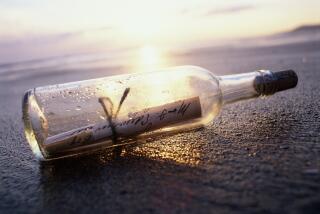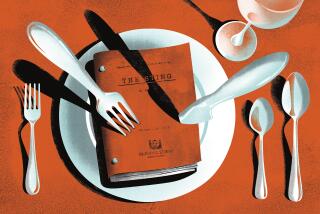A muse in the bottle
- Share via
Horace reports that the 5th century Athenian poet Cratinus, in a light-hearted defense of his famed intemperance, declared, “No verse can give pleasure for long, nor last, that is written by water drinkers.” Cratinus wasn’t entirely kidding: Legend says he died of grief upon seeing a full cask of wine break into pieces. And writers of subsequent ages have taken his sentiment to heart. Wherever you find the pen-and-ink set, drink is an emblem of vivacity and wit, at times regarded with semireligious reverence.
Why do scribblers make drinking their second art? For one thing, it primes them for their task. In 1714, a young Alexander Pope, in an affectionate letter to a lady, began, “Most Divine! -- ‘Tis some proof of my sincerity towards you that I write when I am prepared by drinking to speak truth.” Keats, in an 1819 letter, described how “ethereal” claret “mounts into the brain” and makes one “a Hermes,” god of, among other things, eloquence. “A good sherris-sack,” said Falstaff (speaking, no doubt, for Shakespeare himself) “... ascends me into the brain; dries me there all the foolish and dull and crudy vapours which environ it; makes it apprehensive, quick, forgetive, full of nimble, fiery and delectable shapes which, delivered o’er to the voice, the tongue, which is the birth, becomes excellent wit.” Well, perhaps.
Drink rarely causes a writer to underestimate his talents. And tippling is a handy excuse: Inspired writing produced under the influence is still inspired. But you wrote a tissue of nonsense? Well, one overindulges.
Hart Crane wrote many of his curious poems while comprehensively lathered. You’d never guess. In the early 1980s, Norman Mailer was asked by director Sergio Leone to write a screenplay. Mailer showed his enthusiasm by locking himself in a hotel room for three weeks with a case of whiskey. Leone, says a biographer, recalled hearing Mailer in his room “singing, cursing and shouting for ice cubes.” He did not use the script.
Prudent writers learn to take more out of drink than it takes out of them. Kingsley Amis, in a 1975 interview, prescribed a glass of Scotch as an “artistic icebreaker.” John Mortimer told the New York Times that an early morning flute of Champagne “sets my brain racing.” A roommate of Tennessee Williams reported that the playwright rose early and set his typewriter clacking, after fortifying himself with a martini, a bottle of red wine and a somewhat incongruous pot of coffee.
Some writers have found even deeper use for alcohol. Tennyson, according to his friend James Knowles’ 1893 reminiscence, would “look upon his bottle of port as a sort of counsellor.” When the poet received the letter offering him the poet laureateship of Britain, he brooded inconclusively until finally composing two letters -- one accepting and one declining -- placing them on his table and resolving to decide which to send after finishing his bottle of port. He accepted.
The writer’s life is solitary, but not the drinking writer’s. In his 1975 memoir, “Here at the New Yorker,” Brendan Gill portrays the magazine (where he worked for 40 years) as a society of first-class bingers. One colleague believed that vomiting was, like shaving and showering, a natural part of any morning routine. Edmund Wilson drank at lunch until he couldn’t stand; A.J. Liebling once fled a burning restaurant but not without securing his bottle of brandy; Wolcott Gibbs lugged buckets of premixed martinis to the beach and stored them in the sand.
But there can be a dark side. Booze was the downfall of Hemingway and Fitzgerald, after it “pickled their brains,” in the words of John Irving. Ditto for William Faulkner, Eugene O’Neill and Dylan Thomas, drinkers with writing problems all. “I’m Catholic, and I can’t commit suicide,” said Jack Kerouac, “but I plan to drink myself to death.” Which he did, checking out from liver cirrhosis at the age of 47.
Is there really a muse in the bottle? Christopher Hitchens, an empirical student of the matter, says the connection is “oblique,” but he observes that the “word ‘spirit’ preserves the initial intuition of the ‘inspired’ that was detected by the Greeks.”
Intoxication, if not the source of literary creation, creates a cerebral aura congenial to it. It recasts the glare of life in a softer hue. It soothes anxiety and other stultifiers of reflection. It warms the mind and thaws thoughts frozen in timidity. The fruit of the vine does not give us insight but aids our discovery of it; it can allow you to eavesdrop on yourself.
The trick is to find the golden mean between exhilarating and dulling the intellect. Cratinus’ belief that only bad verses were written without wine seems too appealing to be untrue. But the best verses no doubt arise when, the wine low in the bottle, Dionysus is still steady enough to dance to the tune of Apollo’s lyre.
More to Read
Only good movies
Get the Indie Focus newsletter, Mark Olsen's weekly guide to the world of cinema.
You may occasionally receive promotional content from the Los Angeles Times.










